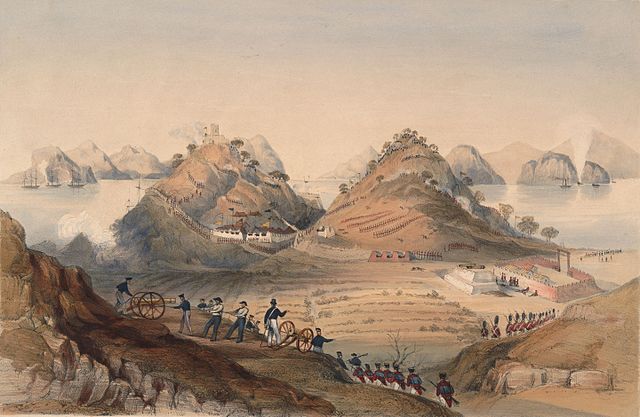The Second Battle of Chuenpi was fought between British and Chinese forces in the Pearl River Delta, Guangdong province, China, on 7 January 1841 during the First Opium War. The British launched an amphibious attack at the Humen strait (Bogue), capturing the forts on the islands of Chuenpi and Taikoktow. Subsequent negotiations between British Plenipotentiary Charles Elliot and Chinese Imperial Commissioner Qishan resulted in the Convention of Chuenpi on 20 January. As one of the terms of the agreement, Elliot announced the cession of Hong Kong Island to the British Empire, after which the British took formal possession of the island on 26 January.
British forces advancing in Chuenpi
The Nemesis (right background) destroying Chinese war junks in Anson's Bay
Nemesis and other British boats engaging Chinese junks at Chuenpi
A 17th century cannon "captured from a Chinese War Junk" by Nemesis and now on display at Windsor Castle.
The First Opium War, also known as the Anglo-Chinese War, was a series of military engagements fought between the British Empire and the Qing dynasty of China between 1839 and 1842. The immediate issue was the Chinese enforcement of their ban on the opium trade by seizing private opium stocks from merchants at Guangzhou and threatening to impose the death penalty for future offenders. Despite the opium ban, the British government supported the merchants' demand for compensation for seized goods, and insisted on the principles of free trade and equal diplomatic recognition with China. Opium was Britain's single most profitable commodity trade of the 19th century. After months of tensions between the two states, the Royal Navy launched an expedition in June 1840, which ultimately defeated the Chinese using technologically superior ships and weapons by August 1842. The British then imposed the Treaty of Nanking, which forced China to increase foreign trade, give compensation, and cede Hong Kong Island to the British. Consequently, the opium trade continued in China. Twentieth-century nationalists considered 1839 the start of a century of humiliation, and many historians consider it the beginning of modern Chinese history.

The East India Company steamship Nemesis (right background) destroying war junks during the Second Battle of Chuenpi, 7 January 1841
View of Canton with merchant ship of the Dutch East India Company, c. 1665
View of the European factories in Canton
Chinese opium smokers







